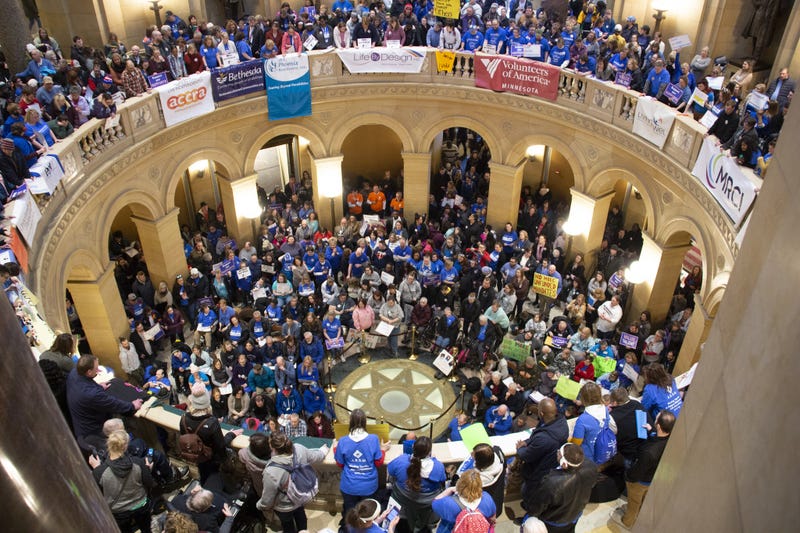
The Rotunda at the Capitol in St Paul will fill with some 1,500 excited visitors on Tuesday March 28, which is Disability Services Day. The group will include people with disabilities, their families and their professional caregivers.
Mary Gaasch will accompany 78 of them, traveling in two accessible buses. The director of advocacy and community relations at Hammer/Northeast Residences, Gaasch will escort the group into the building.
But she emphasized that her busload and the other attendees are not there for a tour, but rather to make an urgent push.
“We are carrying a message to the legislature that this is the time for investment,” Gaasch said. “They need to see that we are in an unprecedented workforce crisis. People talk about a collapse about our care infrastructure.”
Disability Services Day will shed light on the labor performed every day by Direct Support Professionals or DSPs. This dedicated corps of frontline workers are on duty with people needing support with daily living. DSPs work with Minnesotans with intellectual disabilities, brain injuries and other significant and complex medical or psychiatric disabilities.
“Our DSPs do everything from cooking dinner to managing a mental health crisis to changing a catheter to feeding someone with a feeding tube,” Gaasch explained. “But the shame is that they earn less than my 16-year-old twins make at their after school jobs at a restaurant.”
Most DSPs earn between $15 and $16 an hour. Organizations and non-profits that employ them to support people with disabilities say it’s urgent that DSPs get an increase in their pay. But it’s not an easy task to just give them a raise. Minnesota is the only state in the nation where the state legislature sets the rate of reimbursement for DSPs.
The events on Disability Services Day are aimed at closing that gap and seeking for an influx of funds.
“The system is lagging behind the real needs of people in the community. It’s difficult for providers to offer our professional workers a competitive, livable wage,” said John Estrem, chief executive officer for Hammer/Northeast residences, which supports 370 people with disabilities living in residential settings including 68 group homes.
Much is at stake for people with disabilities. As inflation has eaten into the budgets of nonprofits and care organizations, some group homes and small providers have closed their doors. That has meant there are people with disabilities who have been unable to find placement and are sometimes left stuck in hospitals or crisis beds. Other organizations are in a precarious financial position with a deficit budget or have been forced to reduce the range of services they offer.
“As a society we’ve made great strides but there’s still an invisibility factor. We need legislators to see that people with disabilities are active citizens in our communities. They’re neighbors, voters and, in many cases, taxpayers,” Estrem said. “Few legislators understand what we do, how we’re funded and the difference we make in the lives of people we support.”
Despite the stagnant pay, DSPs often are committed to care careers. They “fall in love with the work,” according to Gaasch, and see their work as a calling.
“Many of our folks are West African immigrants and becoming a DSP is an entry point for the American workforce,” she said. “Folks who don’t have work experience can come to us, gain skills, move up the career ladder and grow with us.”
Estrem insists that paying DSPs a higher wage would strengthen the system that supports people with disabilities and represent a wise a use of public dollars.
“The life expectancy of people with disabilities has gone up dramatically. We support people in their 70s and 80s,” Estrem explains. “If we do our work well, they stay out of nursing homes which is wildly more expensive.
The cheap option is to invest up front. A strategic investment will readjust the system so we are not so far behind and save the taxpayer a ton of money in the future.”
After the Rotunda rally and before they get back on their buses, people with disabilities, DSPs and staff will meet with every individual legislator who has group homes and community residential facilities in their districts. They will lobby them to support bills that will bolster the needs and care of people with disabilities.
“We have a large number of new legislators we will meet for the first time along with longtime friends we see every year. When they hear about disability services, we want them to know the names and faces of people who are their constituents and what amazing things people with disabilities are doing in the world,” Estrem said. “More than policy papers, stories change hearts.”

